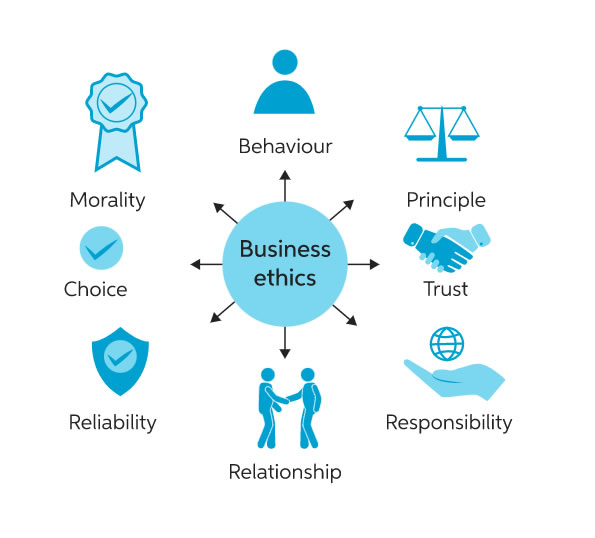Ethics & Integrity
Ethics and integrity are two key concepts that are essential for the functioning of any society or institution. They are closely related, with ethics referring to a set of moral principles that govern the behavior of individuals and groups, and integrity referring to the adherence to those principles in one’s actions and decisions. Together, they form the foundation of trust and credibility that is necessary for any organization or community to function effectively and fairly.

One of the most important aspects of ethics and integrity is that they provide a framework for decision-making. In any situation, individuals and organizations must make choices that affect not only themselves, but also others. Ethics and integrity provide a way to evaluate the moral implications of these choices and to make decisions that are in line with what is right and just. This is particularly important in fields such as business, politics, and healthcare, where decisions can have significant consequences for individuals and society as a whole.
Another important aspect of ethics and integrity is that they promote accountability and transparency. When individuals and organizations are guided by ethical principles and act with integrity, they are more likely to be open and honest in their actions and decisions. This promotes trust and credibility, as well as a sense of responsibility for the consequences of one’s actions. This is particularly important in fields such as government, finance, and law enforcement, where there is a need for trust and transparency in order for society to function effectively.
Another key aspect of ethics and integrity is that they promote fairness and equality. When individuals and organizations act with integrity, they are more likely to treat all individuals and groups fairly and without bias. This promotes social and economic justice, as well as a sense of equality and respect for all members of society. This is particularly important in fields such as education, law, and human rights, where fairness and equality are essential for the well-being of all members of society.

Four principles for high integrity are:
Right is right: No amount of spin and positioning ever changes this fact.
Your words matter: Words are powerful indicators of your character.
Your deeds matter: You can say anything, but, it’s your actions that count the most.
Honour is gained only through trustworthiness
Integrity isn’t easy, but it’s incredibly important for real, lasting growth. From fostering an open and positive work environment to promoting strong and resilient teams, integrity in the workplace benefits employers and employees.

Here are 7 traits associated with integrity
Integrity may seem like a vague concept. If you want to encourage integrity at your workplace and live it out for yourself, you might need a more concrete definition. One of the best ways to understand this concept is to look at the traits associated with integrity.
- Expresses gratitude for others
People with integrity recognize that their friends, coworkers, and community make their lives better. They show gratitude by always remembering to say a simple “thank you” when someone helps them out. They might also take the time to write a thoughtful note to a coworker who helped them complete an important project. Or, they may go the extra mile to give their friend a gift when they’ve supported them through a difficult time.
- Communicates honestly and openly
A person with integrity doesn’t run away from difficult conversations or situations. If they have a conflict with another person, they’re open about it — they don’t hide their feelings only to become resentful later on. They are also honest about their time, abilities, and preferences. No matter the situation, integrity ultimately means your moral principles are more important than your personal comfort — and honesty can be uncomfortable sometimes.
- Takes responsibility for your actions, good and bad
If you have integrity, it means you’re accountable for your actions — even when you miss the mark. It’s easy to take ownership when you do something well. However, integrity really comes into play when you face failure. If you want to live with integrity and grow personally, you must learn to admit when you make a mistake and then choose to learn from it.
- Respects yourself and those around you, no matter where you are
You might not think of boundaries when you think of integrity. However, living in integrity means living at peace with yourself and your values — and relationship boundaries, whether it’s with your coworkers or your family, help you do that. For example, if your friend wants to call you during work, but you need to finish a project, you need to set a boundary and call them later.
Integrity also means respecting others’ boundaries. Let’s say your coworker doesn’t want to talk about their dating life. So as a person with integrity, you don’t ask them certain questions. You also need to respect their time, personal values, and their identity — for example, using correct gender pronouns.
- Helps those in need without sacrificing your own health
This trait goes hand in hand with respecting yourself and others. People with integrity naturally want to help others — but what separates them from most people is their ability to know their own limits. A person with integrity will help others with their time, abilities, and even finances. But they’ll always also prioritize self-care, fueling themselves so that they can stay resilient for years to come.
- Demonstrates reliability and trustworthiness
Knowing how to build trust is important in all of life, especially when it comes to integrity at work. If you’re a member of a team or organization, people count on you to do what you say you will. If you don’t, there will be consequences for not just you, but everyone around you. Being a reliable and trustworthy person is crucial to living with integrity.
- Shows patience and flexibility, even when unexpected obstacles show up
People with integrity overcome life’s obstacles with resilience. For example, let’s say they lost their job. They may feel hopeless or frustrated at first. However, a person with integrity would eventually see that this challenge is just another opportunity for growth. With a bit of patience and flexible expectations, they can take positive action.
Integrity at work is about more than honesty and respect. If an organization has a true culture of integrity, that means employees take their commitments seriously, are proactive when they don’t understand their responsibilities, and ultimately, are accountable for their results. As a result, the business thrives.
We all want to make other people happy and succeed professionally. However, that can lead employees to overpromise on what they’re capable of, resulting in burnout and lack of engagement. Whether it’s constantly missing deadlines or losing interest in work altogether, a lack of integrity will harm both the company and the individuals who make it up.
Despite the importance of ethics and integrity, they are often not always upheld in society and institutions. One of the biggest challenges is the tendency for individuals and organizations to prioritize their own interests over the greater good. This can lead to corruption, greed, and a lack of accountability, which undermines trust and credibility in society and institutions. Another major challenge is the lack of understanding or appreciation for the importance of ethics and integrity, particularly among young people. This can lead to a lack of moral guidance and a lack of commitment to upholding ethical principles in one’s actions and decisions.
Ethics and integrity are essential for the functioning of any society or institution. They provide a framework for decision-making, promote accountability and transparency, and promote fairness and equality. However, despite their importance, ethics and integrity are often not upheld in society and institutions. It’s important to understand their importance and create institutions and systems that promote and uphold the values of ethics and integrity.
It’s also important to educate people, particularly the youth, on the importance of ethics and integrity, so that they can make ethical decisions and contribute to the betterment of society and institutions. Regularly reminding and training employees, creating code of conduct, promoting open communication and transparency, and rewarding ethical behavior can help to create an ethical culture and maintain integrity in the organizations.
Another important aspect of ethics and integrity is that they promote accountability and transparency. When individuals and organizations are guided by ethical principles and act with integrity, they are more likely to be open and honest in their actions and decisions. This promotes trust and credibility, as well as a sense of responsibility for the consequences of one’s actions. This is particularly important in fields such as government, finance, and law enforcement, where there is a need for trust and transparency in order for society to function effectively.
Another key aspect of ethics and integrity is that they promote fairness and equality. When individuals and organizations act with integrity, they are more likely to treat all individuals and groups fairly and without bias. This promotes social and economic justice, as well as a sense of equality and respect for all members of society. This is particularly important in fields such as education, law, and human rights, where fairness and equality are essential for the well-being of all members of society.

